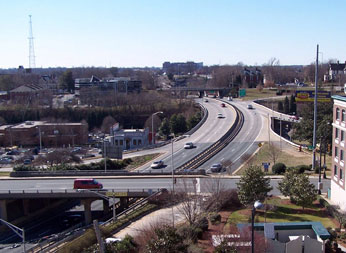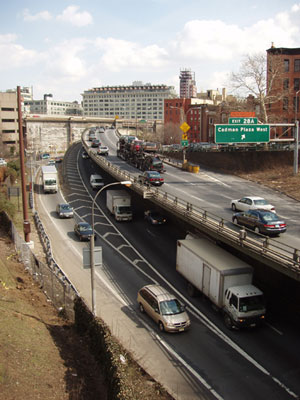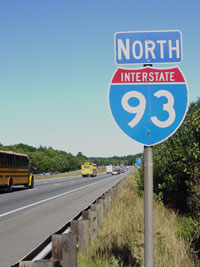U.S. Department of Transportation
Federal Highway Administration
1200 New Jersey Avenue, SE
Washington, DC 20590
202-366-4000
Focus
| Accelerating Infrastructure Innovations |
Publication Number: FHWA-HRT-07-010
Date: January/February 2007
"Building on Success" is the theme today of the Federal Highway Administration's (FHWA) Accelerated Construction Technology Transfer (ACTT) program, as the ACTT concept matures and more States adopt the ACTT goals as standard practice. Started by the Transportation Research Board, American Association of State Highway and Transportation Officials (AASHTO), and FHWA, ACTT brings State highway agency staff together with national experts in a range of skill sets for a 3-day workshop. At the workshop, participants identify innovative approaches to reducing time, costs, and congestion for a planned highway project while improving safety, quality, and roadway performance. Twenty-nine workshops have been held to date. Most of the projects that have been let have seen a reduction of planned construction time by 30 percent or more. Millions of dollars have also been saved.
As the ACTT goals become standard practice, States are now holding their own ACTT workshops. The FHWA ACTT Team will help States plan, organize, and carry out the workshops, which are eligible for Federal-aid funding. "ACTT is not a one-time event, but rather another tool in the tool box to improve project delivery," says Christopher Schneider of FHWA's Office of Asset Management.
The Ohio Department of Transportation (ODOT) hosted a workshop from January 9-11, 2007, to discuss a planned project on the I-70/I-71 corridor in Columbus. The project's goals include reducing congestion and improving operations and safety on the corridor, meeting or exceeding current ODOT design standards for urban freeway facilities, enhancing the movement of freight and goods within and through the corridor, and integrating the freeway with the arterial street system and alternative modes of transportation in the community. The workshop focused on innovative methods to shorten construction time and minimize disruptions to traffic and the nearby community, including businesses, historic districts, hospitals, and universities. Workshop participants looked at such issues as sequencing the work to minimize disruptions, providing practical schemes for traffic diversion, reducing or controlling noise impacts during and after construction, and providing structure and retaining wall options that work within the right-of-way and utility constraints.
| "ACTT is not a one-time event, but rather another tool in the tool box to improve project delivery," |
The Idaho Transportation Department (ITD) will host a workshop in Boise from February 13-15, 2007. The workshop will focus on accelerating a planned project on the I-84 corridor in the Boise metropolitan area. This area was rural when the Interstate was constructed in the late 1960s but is now one of the fastest growing urban areas in the country. I-84 is the only major east-west transportation link through southern Idaho and serves as a major commuter route for communities within Idaho's Treasure Valley. Improvement of the corridor will provide traffic congestion relief as the Treasure Valley continues to expand. Without the needed improvements, the ITD expects that both Interstate and local commuter traffic will experience critical congestion levels in the next decade. The ITD also sees an urgent need to accelerate construction due to the overall anticipated project duration, traffic impacts, and safety of the traveling public.
 |
| Improvements to the US 421/I-40 Business corridor in Winston-Salem, NC, were discussed at an April 2006 ACTT workshop. |
 |
| A March 2006 ACTT workshop in New York City looked at accelerating a project on the Brooklyn-Queens Expressway. |
The project segment of I-84 currently consists of a four-lane divided freeway that has not seen any major improvements since it was constructed in the 1960s and 1970s. The existing concrete pavement is failing and ramp taper lengths at all of the entrance and exit ramps do not meet current AASHTO standards. The road also needs to be widened to accommodate projected traffic growth. Existing structures along I-84 will need to be replaced, along with the majority of the overpass structures, to accommodate the needed widening. The workshop will look at such project issues as innovative contracting, construction, structures, and right-of-way/utilities/railroads, with the goal of cutting construction time from 12 to 6 years.
A new FHWA report, Accelerated Construction Technology Transfer: Building on Success (Publication No. FHWA-IF-07-015), looks at projects underway that were analyzed using the ACTT process. FHWA's Office of Asset Management surveyed agencies that have let projects to capture successes and lessons learned for other departments of transportation. "The results highlighted in the report offer a glimpse of the many dividends this process yields, both for the transportation agencies involved and for the traveling public," says Jim Sorenson, Acting Director of the Office of Asset Management. The Oklahoma Department of Transportation (ODOT), for example, has realized an estimated $15.8 million in savings as a result of the ACTT workshop held in 2004 for its $360 million I-40 Crosstown Project in Okahoma City. "This was a worthwhile and beneficial effort," says ODOT Project Development Engineer John Bowman. After hosting an ACTT workshop in 2003, the Louisiana Department of Transportation and Development reduced the timeframe for construction on its I-20 rehabilitation project in West Monroe from 225 to 125 days. Construction was completed in March 2006. The report also highlights recommendations from the workshops that are proving applicable to other projects nationwide. Recommendations are featured for each workshop skill set, including construction, structures, roadway/geometric design, the environment, and innovative contracting/financing. Also included is contact information for the skill set team leaders. For more information on ACTT, contact your local FHWA division office. To obtain a copy of the new ACTT report, contact Christopher Schneider in FHWA's Office of Asset Management, 202-493-0551 (email: christopher.schneider@fhwa.dot.gov). All ACTT materials are also readily available on the ACTT Web site at www.fhwa.dot.gov/construction/accelerated. |
States that are considering hosting an ACTT workshop can consult ACTT: A "How To" Guide for State Highway Agencies (Publication No. FHWA-IF-05-038). This FHWA guide includes background information on the ACTT program and details on how to plan and hold a workshop. Also included are sample workshop agendas and lists of the various ACTT skill sets and their team leaders. Skill sets cover such areas as design, contracting, financing, construction, right-of-way/utilities, and the environment. FHWA maintains a national roster of skill set experts and can assist States in setting up skill set teams for a workshop.
 |
| New Hampshire's February 2006 ACTT workshop studied the I-93 Salem to Manchester improvement project. |
Additional information on ACTT, including reports on workshops held to date, is available at www.fhwa.dot.gov/construction/accelerated. To learn more about holding an ACTT workshop in your State or to obtain a copy of the "How To" guide, contact your local FHWA division office or Christopher Schneider in FHWA's Office of Asset Management, 202-493-0551 (email: christopher.schneider@fhwa.dot.gov).